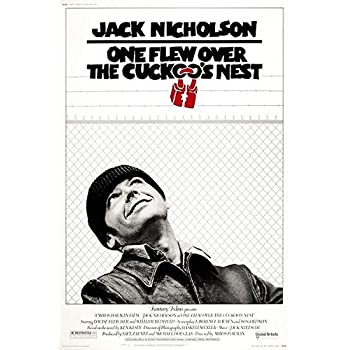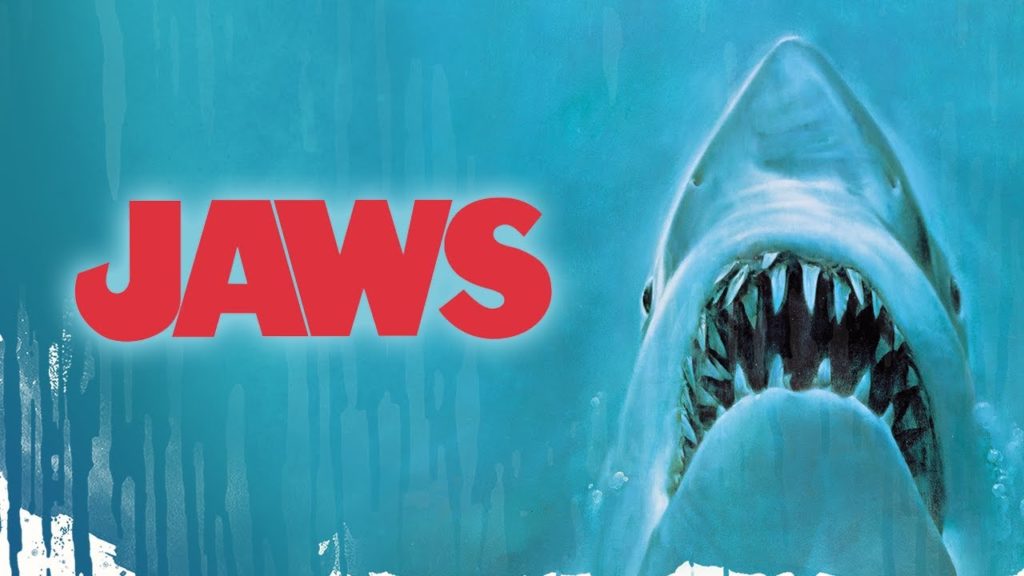1975
So a problem of the big hits of the 50s and 60s is it seemed that there was a ceiling on how much a movie could pull in. Witness Cleopatra, ruling the 1963 box office and still losing money. Well… those days are wrapping up. The Dawn of the Blockbuster is upon us.
But this series is supposed to be about the Oscars so before we get to that, we gotta talk about this.
And The Oscar Goes To…
Look I took precisely one film class in university and this one was on our watch list, obviously it’s a film of some note. I’ve seen the movie (twice now) and the stage play, but not read the novel, which means I probably still have a stronger grasp of the story than the makers of Netflix’s Ratched. Although my opinion of that series softened once someone announced they were working on a Robocop prequel about Dick Jones climbing the corporate ladder. If that’s the other option, sure, make the Mean Nurse a lesbian serial killer, why not.
I don’t know who doesn’t know this one but if I don’t quickly sum up the plot I’m gonna feel weird. Randle McMurphy (Jack Nicholson) gets committed to a mental hospital in the late 60s, thinking convincing people he’s crazy would be easier than the hard labour he’d been sentenced to for… crimes, let’s just say crimes. But he soon collides with head nurse Mildred Ratched (Louise Fletcher), who values above all order and control over the men in her wing. The two battle over how the inmates should be treated, as Randle proves either a bad or good influence over his fellow patients, depending on your perspective. The movie serves as a condemnation of the poor treatment the mentally ill or neurodiverse used to (and to an admittedly lesser extent still do) receive.
Not just the Best Picture, Cuckoo’s Nest was the second movie ever to sweep the “big five” categories (Picture, Director, Actor, Actress, Screenplay), first since It Happened One Night, and it’s not hard to see why in a couple of those categories. Jack Nicholson brings a whole lot of chaotic energy to McMurphy, striding the line between maniac and messiah. The other patients, including Danny DeVito, Christopher Lloyd, and Brad Dourif keep up admirably, each their own flavour of misfit society deemed “sick.” And of course Louise Fletcher makes Nurse Ratched an iconic villain: Ratched is the face of the cruelty and indifference the mental health system had for those under its care. Through Ratched therapy becomes about shame and bullying rather than assistance; electroshock is strictly punitive, not therapeutic (now called electroconvulsive therapy, it’s still used to treat severe depression and is 80-90% effective), and… okay lobotomy was always a bad idea, wasn’t it? Nobody needs to put a bad face on lobotomies.
Ratched works so well because she’s not some over-the-top monster, she’s an all-too-human monster, a bureaucratic bully, an abuser who knows and enjoys what power she holds over lives, but thinks she’s righteous. And that’s why making her a sinister murderer in Ratched both utterly undermines this movie and is the only possible way to make an origin story for the character. Just don’t bother thinking of them as connected and it’s fine.
Did it deserve Best Director? Questionable, but voters typically feel that the Best Picture needed the Best Director to make it. Did it deserve Adapted Screenplay? Mostly yes, although the movie dramatically reduces the role of “Chief” Bromden, both a central character and the narrator of the novel it’s based on. I get that McMurphy demands a lot of attention, but having also seen the stage version, it does feel like Bromden got shafted a little.
And Rotten Tomatoes Says: It comes it at #32, seen as not just an indictment of mental health care but a microcosm of the 70s culture wars. I mean sure you could make that argument, yes.
What’s New, Hollywood? I can’t see a protagonist like McMurphy existing in Old Hollywood. He certainly seems like a hero next to Ratched but he did some bad things to get into this predicament, and might have gotten out of it intact if he didn’t set out to pick a fight with a stuck-up nurse. Of course maybe he could have just done two months of labour and walked away if said nurse hadn’t kept him around, possibly just to break him. They might have approved of Randle’s classically tragic end, though… inches from freedom, with one choice he instead seals his doom, that’s Old School Tragic.
It was a big hit, making over twice as much as the next film down 1975’s top ten hits. Which means the Academy is still trying to stick with current tastes… but there was an unexpected box office juggernaut like nothing else in decades. You might say it swam up from the murky depths and fine I’ll stop being coy let’s just do this
The Box Office Champ
Jaws, everybody.
In the remote chance someone out there doesn’t know what Jaws is about, Mitchell and Webb can explain.
Steven Spielberg, possibly still our greatest living director (barring some tragic turn of events right after I hit “publish”), began his reign as a Box Office Hit Machine with a movie about a shark that owes a weird amount of its success to things going utterly wrong.
I mean if you care about movies at all you probably know this: the mechanical shark didn’t look great, but also kept breaking, forcing Spielberg to hide it from view. In the movie’s climax, the shark is mostly seen as floating barrels that have been attached to it via harpoons, and holy cow that works so much better. The great menace of sharks is that they’re under the water, they can be feet away from you and you don’t know, so the shark being out of view adds way more dread than clear shots of a so-so mechanical shark could ever have done. Even modern day flicks like 47 Meters Down and its sequel make brilliant use of not knowing where the shark is until it’s right on top of you. Cameras swoop through the water, near swimmers’ legs; barrels resurface; a pier is pulled off by an unseen force, then ominously changes direction towards the man floundering in the water. Each one a nail-biter.
Spielberg already delivers masterful framing and Hitchcock-level skill with suspense, both on display in an early sequence when Chief Brody (Roy Scheider) is anxiously scanning the waters, thinking any disturbance might be a second shark attack, while locals try to bug him about out-of-towners taking their parking spots. Sinister splashing happens right over the shoulder of the complainer, whose face is cartoonishly large in the frame.
Robert Shaw has been in three movies in this project (A Man For All Seasons, The Sting, and this) and each time I can only sort of recognize him, given how different he’s made each character. I get how he got top billing. Roy Scheider’s the real protagonist, and his desperate attempts to bring sanity to the shark hunt give the movie a great anchor. Richard Dreyfuss as Hooper, the marine biologist, brings some useful comic beats and some well done panic. And the scene where Shaw and Hooper trade stories and scars while the shark lurks nearby is a much-copied classic for a reason.
And goddamn but Chief Brody trying to close the beaches for safety and being told he can’t because it would hurt the economy is very apt to the modern day. If anything it’s mild next to 2020’s COVID response, because the mayor doesn’t blame the shark deaths on people reporting shark deaths, and there aren’t fifty people jumping in the ocean slathered in BBQ sauce because the MAN can’t take their FREEDOM.
Sure Spielberg couldn’t yet get a convincing robot shark, but he could stage a scene and nail the hell out of a shot. Jaws is often imitated, but never equalled, even (especially?) by its own sequels.
And Rotten Tomatoes Says: 98% from critics (4% higher than Cuckoo’s Nest), 90% from audiences (6% lower than Cuckoo’s Nest, interesting), a true and utter classic whose only sin is giving a vital and misunderstood animal a bad name. Sharks are good and majestic creatures, people.
What’s New, Hollywood? No movie in the history of the medium had made money like Jaws did (Blah blah inflation blah blah Gone With the Wind). Jaws was the first modern blockbuster, first to clear over $100 million. Spielberg rocketed from up-and-coming to titan of the industry starting here, and while the Oscars nominated it for Best Picture to try to seem cool, here’s where it became clear that Art and Commerce were heading in different directions.
Other Events in Film
- George Lucas creates his own special effects company, Industrial Lights and Magic, for this thing he’s working on with some spaceships and laser swords and whatnot.
- Musicals were still happening without roadshow releases, specifically the Who’s rock opera Tommy and midnight crowd favourite The Rocky Horror Picture Show. Any good will they generated for the genre might have been killed by At Long Last Love.
- Gene Siskel and Roger Ebert team up for the review show Sneak Previews.
- Rudy Ray Moore becomes a star with his passion project Dolemite, the making of which was made into a movie you can and should watch on Netflix right now.
- The Flying Circus reunites for the eternal classic Monty Python and the Holy Grail.
- After 11 years, Peter Sellers returns to Inspector Clouseau in Return of the Pink Panther.
- French Connection II gives Popeye Doyle the rematch with smuggler Alain Charnier that the real-life people they’re based on never had. It was not as successful as its predecessor by any metric, unless you’re married to “the bad guy gets his” as a metric of quality.
- Disney gets a live action movie into the year’s top ten box office with The Apple Dumpling Gang, something they rarely accomplished back then.
- Robert Redford does the paranoid political thriller Three Days of the Condor that everyone brings up when discussing Captain America: The Winter Soldier.
- It’s probably giving Death Race 2000 too much credit to call it a “B-movie” so maybe I don’t need to mention its release this year but I’m still gonna. I’m also going to flag Joe Don Baker as Mitchell, only because it became an all-time classic episode of Mystery Science Theater 3000, the very episode where Joel escapes the Satellite of Love and is replaced by Mike. As we all know.
Next Page: The Italian Stallion


